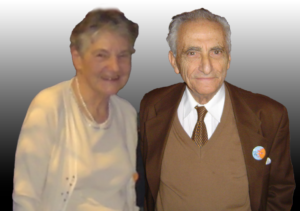
Monique and Roland Weyl were an exceptional duo in life, in activism and in the legal profession. They were, in the true sense of the word, advocates for the people and the peoples.
Monique and Roland brought their professional activities into line with their conception of the world. This was evident in their tireless activism for the liberation of peoples and their rights to self-determination and development, peace, gender equality, the rights of the working classes, and the defense of countries that have chosen a socialist path of development. They never hid their communist convictions.
It is futile to try to list all the causes for which Monique and Roland Weyl campaigned and worked as lawyers. They included the liberation of the Algerian, Vietnamese, Cuban, Korean, Palestinian and many other peoples. They joined the struggle of the Stockholm Appeal against Nuclear Weapons that had gathered tens of millions of signatures around the world. Monique and Roland wrote a legal analysis of the illegality of NATO under international law, and in particular, under the Charter of the United Nations. But they weren’t just writing an argument. They explained and spread their ideas in the peace movement and in the demonstrations against NATO. Theory and practice were inseparable for Monique and Roland.
During much of their professional and activist life, they were among the most active members of the International Association of Democratic Lawyers (IADL). They forged ties with jurists from all over the world who shared their conviction that the practice of a democratic jurist should be in harmony with their progressive and emancipatory views.
Monique was instrumental in all of the activities of the IADL until her death in 2009. Shortly before she died, Monique attended the IADL Congress in Hanoi. Roland was present at the founding Congress of IADL and served as a judge on the IADL Board for decades. He served as First Vice-President of IADL since the Brussels Congress in 2014. But before entrusting him with this function, it was necessary to assure him that this was not an honorary title but rather a combat post. It was not a difficult promise because Roland’s contribution was invaluable, even when he was already a centenarian. Not only did he intervene in the discussions with exceptional insight, but he also shared with subsequent generations the valuable lessons of past experiences.
It was Roland and Monique who explained to the other democratic jurists that there could be no human rights without the rights of peoples, no individual rights without collective rights, and no political and civil rights without economic, social and cultural rights. In this sense, they had a universalist vision of human rights.
Monique and Roland jointly published many texts defending international law at a time when it was under the attack by the right-wing neo-conservatives in the U.S. Many young progressive jurists criticize international law and the United Nations for their ineffectiveness or instrumentalization by Western powers. Monique and Roland did not deny this reality, but rather opposed the denial and abuse of international law with all their might. Tirelessly, without aggressiveness, but with a remarkable sense of pedagogy, they consistently explained that the UN Charter prohibits the use of force in international relations and establishes the principle of sovereign equality among peoples. They also explained that the UN Covenants guarantee all peoples the right to self-determination, and by virtue of this right, they freely determine their political status and ensure their economic, social and cultural development. These guarantees were major advances that had been achieved by the anti-fascist resistance and by the struggles for decolonization. In the face of the attempts to dismiss these instruments as useless pieces of paper, Roland and Monique explained that, on the contrary, it was necessary to defend these achievements of popular struggles and to fight, on the basis of the principles enshrined in these texts, for their defense and their complete implementation.
Monique passed away on October 17, 2009. Roland was inconsolable. He had not only lost his companion but also his accomplice, his comrade in combat.
Roland passed away on April 20, 2021, at the age of 102.
Thank you for registering for the People’s Academy! You will be auto-registered for future courses and seminars. For the upcoming seminar, please register with the following link: